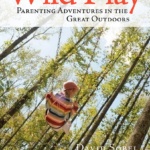
By David Sobel
Are you concerned about the academification, indoorification, and digitalization of your child’s life? Especially now, post-pandemic, when most children were forced to be indoors and plopped down in front of screens for much of their schooling?
I felt the same way, even a couple of decades ago when I was raising my children in rural New Hampshire. As a family, we avoided television until my children were about eight years old, though we did borrow DVDs from the library for family viewing. And I am thankful that my wife and I didn’t have to deal with the cell phone problem when my children were growing up.
Instead of being seduced by digital devices, I wanted the local landscape mapped out on the backs of my children’s hands. I wanted them to grow up blueberry-stained, trail-weary, watershed-saturated, and with some apple cider—pressed from the apple trees in their backyard—flowing in their blood. That’s a fancy way of saying I wanted my children to connect to and bond with nature. That’s what Wild Play: Parenting Adventures in the Great Outdoors is about. I think it’s more relevant now than when it was originally published in 2011.
First, a bit of clarification. The “wild” in Wild Play doesn’t mean out-of-control play. It means play in wild places. We had a lot of wild places nearby—the apple trees in the backyard, the frog pond next door, the pine grove over behind the Putnams’ house. In progressively wider circles, we played with our children outdoors, had them help with outdoor chores, and gradually let them explore independently. I slowly let them become “free-range children.”
That meant I had to accept a certain amount of anxiety about what they were doing and where they were going. I moved away from a “risk assessment” mindset to a “risk-benefit analysis.” In other words, developing a balanced understanding of the risks and benefits of a free-range childhood was important.
All play, including nature play, involves some risk, but that’s part of the value: learning to measure the risk and behave appropriately. The riskiness of play is, to a certain extent, its benefit. Take all the risk out of the situation, and it’s no fun—and not beneficial.
The book is a collection of essays I wrote from when my children were just toddlers until their early adulthood. I had good raw material for writing these reflective essays on parenting because I was a conscientious journaler. I captured their language development, their made-up games, and my emotional ups and downs.
As I looked at all these essays, I conceptualized three stages in the development of bonding with nature. The first stage was being together with children in the early childhood meadow. The second stage was exploring the woods, parents and children together, and then easing them into exploring by themselves in the middle childhood forest.
In the third stage I let them engage in moderately risky outdoor pursuits on the adolescent rocky ridge. An example of the rocky ridge was when I took my son for a rite of passage ski experience in Tuckerman Ravine. He was an accomplished skier before this, but this was a test of his mettle. And it reflects the necessary risk-benefit mindset of parenting in adolescence. Later, when I asked him to write about what the experience meant to him, he wrote:
‘It was always something I wanted to do when I was younger like it was the guy thing to do. So I felt I had really done something big like I had conquered it. And mentally, I think it made me a better skier since it helped me manage my fear. Last summer, when I hiked those peaks around Zealand with my class, I used that same backpack Bo lent me. When I’d start to feel tired, I’d think, well, this backpack went up Tuckerman, and this isn’t nearly as hard, so I knew I could do it. After Tuckerman, I knew I could be more adventurous and take on bigger challenges because I knew I was strong.”
For Eli, it was the right challenge at the right time, and that’s what I was after all along. How do I challenge my children in developmentally appropriate ways that lead to personal growth and a sense of inner strength?
I hope you’ll find that this is a good book for young parents, educators, and grandparents. As I’m now in grandparenting mode, it’s fun to see the patterns I saw in my children’s development, re-unfolding in the grandchildren. And being a grandparent helps me be young again. As Tom Robbins said, “It’s never too late to have a happy childhood.”
David Sobel is a professor emeritus in the education department at Antioch University New England in Keene, New Hampshire. He’s written 10 books, mostly about children, nature, and education.


Sorry, the comment form is closed at this time.